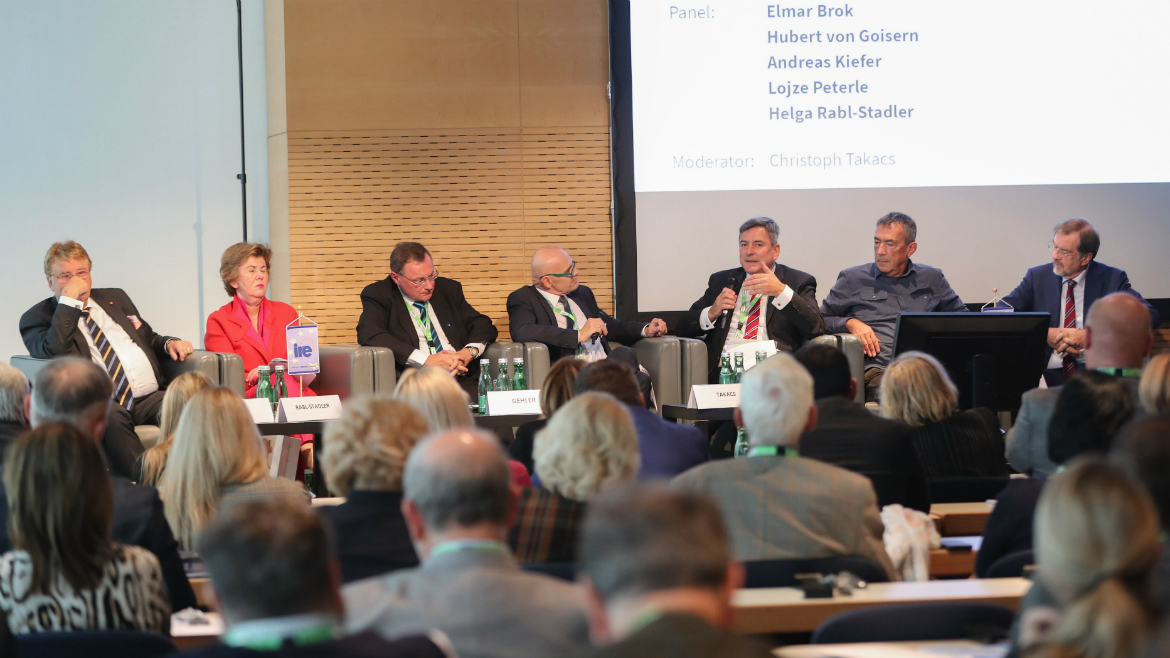Speaking in a panel discussion on “Europe – a project for peace?”,the 6 October 2019 in Salzburg, the Secretary General of the Congress, Andreas Kiefer, outlined the achievements of the Council of Europe for the freedoms and liberties of the European citizens since its establishment in 1949. The European Convention on Human Rights as the basis and 223 additional conventions and protocols encompass the values of Europe. One of the key conventions which represents the European model of society, is the European Charter of Local Self-Government, ratified by all 47 member states, which grants the right of local communities to organise their affairs in autonomous responsibility according to the distribution of powers in the member states.
Responding to a question how the peaceful commitment of citizens to the European values could be expressed, Andreas Kiefer proposed to add a (second) verse in each national anthem of Council of Europe member states referring to this European identity, which complements the national and regional identities. This could also be an occasion to analyse the wording of verses in national anthems, which sometimes glorify battles and war and therefore were fully inappropriate in the 21st century.
Peace is more than the absence of war, Andreas Kiefer underlined. Peace needs political pioneers and minds who describe a vision, peace needs legal standards that grant it, furthermore institutions (and political leaders in it!) that secure it and the "beneficiaries", ie the people, and a strong civil society that can live in peace and who are prepared to take to the streets and, as it were, develop and practice an identity for the European values of democracy, human rights and the rule of law.
People must be the beneficiaries of European integration.
In its 70 years of activities, the Council of Europe has achieved a lot: in concrete terms, this comprises the abolition of the death penalty, prevention of torture, freedom of assembly and expression, standards for local self-government, combating discrimination and racism, gender equality, child protection, cultural identity, combating corruption, combating domestic violence and the sexual exploitation of children, trafficking in human beings and ensuring the quality of medicines, just to name a few.
In implementing the criteria mentioned above the milestones and key provisions in the history of the Council of Europe are the Congress of The Hague in 1948, the Treaty of London of 5 May 1949 establishing the Council of Europe and its Statute , the European Court of Human Rights and a set of more than 220 treaties and additional protocols protecting citizens against encroachments by the state and defending their liberties and freedoms. Independent monitoring bodies assess the respect of the commitments undertaken by all member states and report to the Committee of Ministers.
Peace within member states also depends on respect of powers and checks and balances between the different levels of government. The European Charter of Local Self-Government and European Framework of Reference for Regional Democracy are the criteria for that, the Congress Secretary General said.
From 6 – 8 October 2019, organised by the Institute of the Regions of Europe (IRE) in Salzburg, Austria, some 600 participants from more than 20 European countries discuss the role of European institutions in the peace process in Europe. Specific sessions focused on “Ukraine – Russia: Chances for a peaceful solution”, “Peace in the Western Balkans – Peace in Europe” and “Currency and Peace in Europe – 20 years of the Euro”. www.institut-ire.eu





